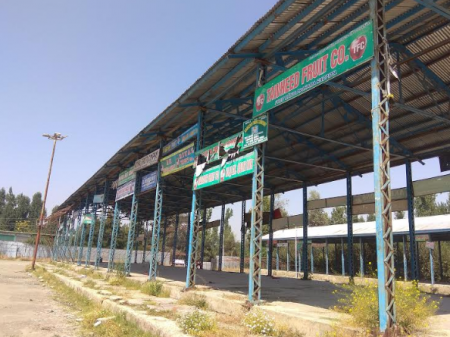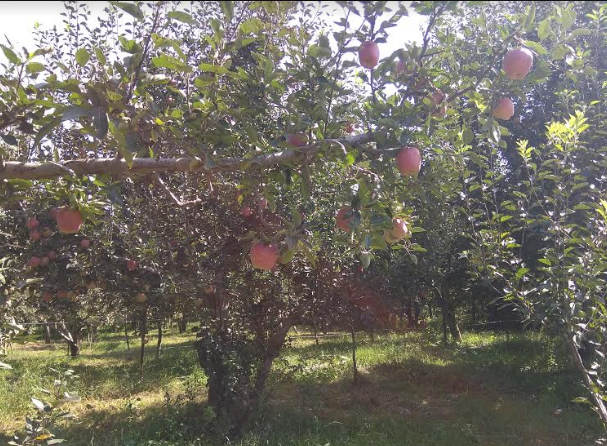Last year in August, over 100 trucks with apple consignments left the mandi daily for 90 different markets across the country. This year, only 45 trucks left for just nine markets in August.
Around 50 km from Srinagar, in North Kashmir’s Sopore town, which produces the highest number of apples in the region, the growers and traders are in a fix, as the second largest fruit mandi in the sub-continent faces challenges due to the ongoing crisis in the Valley.
More than 1,200 traders operate from Sopore fruit mandi and have always remained functional despite the turmoil in the region. “Whether it was during the armed insurgency in 1990s or mass uprising in 2008, 2010 or 2016, the business never stopped. But today the situation in different,” says Mohammad Lateef, an apple trader.
According to the traders, the current clampdown enforced since August 5 due to the abrogation of Article 370 has played a major spoilsport. The trouble for the traders increased due to the lack of any communication channel.
“We couldn’t connect with the buyers or sellers since the situation has worsened. We don’t have a clue about the prices in the other markets as well,” another trader says.
In the Kashmir division, there are three main fruit markets: Sopore, Srinagar and Shopian.
Between Government Clampdown and Civilian Shutdown
For some time, the Sopore fruit market worked in the night. But now it has been mostly shut. The operations in the market were halted after tensions heightened in the area. The reason, other than the government-enforced clampdown, is also the shutdown and a subsequent diktat by militant groups.

On September 6, four persons of a family, including an infant, were injured after unidentified gunmen barged into the house of fruit trader Abdul Hamid Rather in Dangerpora. Rather was not home; however, the gunmen opened fire on his family, injuring four members. The aim of the attack, according to police, was to instill fear among traders.
Several growers in Shopian’s main market, Trenz and Turkawangam, and adjacent villages believed that the Hizbul Mujahideen’s district commander Naveed Babu has asked people to avoid apple harvesting this year. There is a strong rumour claiming that the militant, who belongs to a family of apple growers, has called for wasting this year’s crop.
“We will follow the same unless there is an alternative,” an apple grower from Turkawangam told NewsClick.
In South Kashmir, locals say, militant groups disseminate information through posters and sometimes by visiting the orchards themselves.
The Broken ‘Backbone’ of Economy
Data from the area marketing office inside Sopore’s market, which works under J&K’s Horticulture Department, shows that last year in August, more than 100 trucks with apple consignments left the mandi daily for 90 different markets across the country. This year, the data reveals, that only 45 trucks left for just nine markets in August.
Referred to as the ‘backbone’ of the region’s economy, the apple industry contributes almost 8% to the total GDP (gross domestic product) of J&K, as per official data. A Rs 8,000-crore industry, it is also considered one of the largest employment generation sectors with more than seven lakh families directly or indirectly engaged with it. According to official data, J&K has produced 24.3 lakh tonnes of fruits in year 2018 out of which 21.61 lakh tonnes comes from the Kashmir division alone.
So far, according to Javid Ahmad, chief horticulture officer in Srinagar, this time, only 30% of crop harvesting of the season is going on. “The remaining 70%, which includes the premier brand of apple called ‘Delicious’ is yet to be harvested,” Javid says.
District Baramulla in North Kashmir, which includes production from Sopore, constitutes 40% of the total apple production followed by Kupwara, Anantnag and Shopian.
But everything has come to a standstill.
Government Intervention
Due to the ongoing crisis, the J&K governor Satya Pal Malik on Thursday launched a “Market Intervention Scheme” for apples as a measure to provide security cover to the apple growers in the region. Under the scheme, the government said it would provide security cover to the apple growers while the entire apple packaging process is done.
The government has involved National Agricultural Cooperative Marketing Federation of India Ltd (NAFED) which will look after issues relating to grading of apples, procurement and storage and marketing of the fruit.
Many growers, however, believe that involving an intermediary like NAFED is not new for them.
“They have their own parameters of grading and marketing which does not necessarily benefit the local growers in Kashmir,” a grower in Srinagar said.
He added: “Such an intervention by the government involving an external intermediary is another act of altering the local system.”
‘Sacrificing’ the Harvest
The worry among the growers is not just grading or marketing, but the larger issue of the protests and the clampdown.
In South Kashmir’s Shopian, where the best quality of Kashmiri apple is grown, the fruit mandi is deserted. No growers, buyers, traders, sellers or transportation are visible.
No one ventures inside the orchards. The growers have decided not to harvest the crop this year.
“The apples will stay on the trees,” Owais says. A resident of Shopian town, Owais, says that everyone believes that the apple harvest season could result into the end of protest shutdown.
“It has happened in the past; the valley remained shut for months and then due to the apple harvest, the shutdown gradually wanes,” he adds.
Apple harvest season is a critical time for growers, which comes after a year-long hard work and an average expenditure of Rs 3-5 lakh.
For Adil Ahmad, a sumo driver from Shopian, orchards are the only means of financial security for his family. His orchards produce as many as 3,000 fruit cases, with one case usually weighing about 19 kg being sold in Delhi’s Azadpur mandi for Rs 1,200 approximately.
But he is afraid to visit his orchards.
“We tried to load a truck a week ago in the night, but after some time, we noticed a cross marked in red on the truck. We stopped there,” Adil says.
Adil adds, the growers have made a collective decision about the harvest this year. “What happens to one grower will happen to all of them is the decision,” he says.
Courtesy: Newsclick.in

